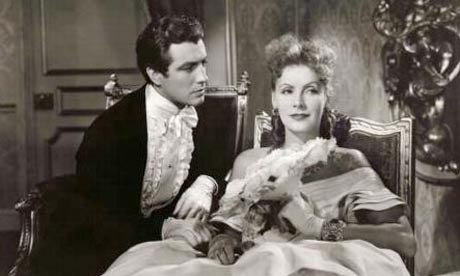CAMILLE
SUBJECTS — Cinema; World/France; Drama/France;
SOCIAL-EMOTIONAL LEARNING — Romantic Relationships;
MORAL-ETHICAL EMPHASIS — Respect.
AGE: Age: 12+; No MPAA Rating;
Drama; 1937; 108 minutes; B & W.
There is NO AI content on this website. All content on TeachWithMovies.org has been written by human beings.

SUBJECTS — Cinema; World/France; Drama/France;
SOCIAL-EMOTIONAL LEARNING — Romantic Relationships;
MORAL-ETHICAL EMPHASIS — Respect.
AGE: Age: 12+; No MPAA Rating;
Drama; 1937; 108 minutes; B & W.
It is France in the mid-nineteenth century. Marguerite, a beautiful courtesan, lives a life of extravagance, but she is ill with consumption, at that time an incurable disease. Marguerite has never known true love until she meets Armand, a young man who has applied to work in the foreign service. When Marguerite renounces her life in the demimonde and they announce their plans to marry, Marguerite receives a visit from Armand’s father. He reminds her that if she and Armand are married, Armand’s career will be doomed, and his sister excluded from “good” society. The father pleads with Marguerite to leave Armand. What will she do? What will Armand do?
Selected Awards: 1937 National Board of Review Awards: Ten Best Films of the Year; 1937 New York Film Critics Awards: Best Actress (Garbo); 1937 Academy Award Nominations: Best Actress (Garbo)
Featured Actors: Greta Garbo, Robert Taylor, Lionel Barrymore, Henry Daniell, Elizabeth Allan, Rex O’Malley, Lenore Ulric, Laura Hope Crews.
Director: George Cukor.

Camille was a member of the “demimonde.” The word literally means, in French, “half-world.” In the demimonde courtesans gave their favors to “protectors” in return for being supported in a lavish style. The courtesans of the Parisian demimonde in the 19th century were often independent, and the financial contribution to be made by their protectors was often set out in a written contract. While the courtesans of the demimonde had a social standing well below that of virtuous and respectable women, they were not considered prostitutes. Still, it would have brought shame on a “respectable” family if one of its sons married a courtesan. The demimonde flourished in France, and perhaps in other countries, during the 19th century.
The film is based on the classic play “La Dame Aux Camelias” (The Lady of the Camellias) (1852) by Alexander Dumas, the Younger. The play, in turn, was based upon the life of Marie Duplessis who was buried in Paris in 1847 after dying of tuberculosis at the age of 24. It is reported that to this day people put flowers on her grave. The play was popularized in the United States under the name “Camille.” Verdi wrote the beautiful and tragic opera, La Traviata, based upon this play.
A delightful and more modern treatment of the situation of two lovers who just barely escape the trap of the demimonde is contained in the musical Gigi. There the prospective protector ultimately decides to marry Gigi rather than to relegate her to the world of the demimonde. There is merit in showing children “Camille,” La Traviata, and Gigi, in that order.
Can there be a truly romantic relationship between a man and a woman of the demimonde? What is missing?
Suggested Response:
No. A true romantic relationship is among equals. What is missing in a relationship in which a man keeps a woman for sexual pleasure and good times is respect and true caring.
1. See Discussion Questions for Use With any Film that is a Work of Fiction.
2. Do you think that the “demimonde” still exists today?
3. What was Camille’s illness?
4. What were the men appointed by the court doing in Camille’s apartment?
5. Was Armand’s father justified in sending Camille away? Why did he later repent this action and tell his son that Camille was dying?
1. Why couldn’t Camille and Armand Duval simply get married?
2. What was the relationship between Camille and the Baron de Varville?
3. What is meant by a woman of the moment? If Camille had continued with the Baron de Varville, would they still have had a relationship in 20 years?
(See the Ethical Emphasis section below for an additional question on this topic).
Discussion Questions Relating to Ethical Issues will facilitate the use of this film to teach ethical principles and critical viewing. Additional questions are set out below.
(Treat others with respect; follow the Golden Rule; Be tolerant of differences; Use good manners, not bad language; Be considerate of the feelings of others; Don’t threaten, hit or hurt anyone; Deal peacefully with anger, insults, and disagreements)
See Quick Discussion Question.
Last updated December 9, 2009.